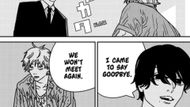Chainsaw Man Chapter 213 has set the fandom ablaze with its chilling cliffhanger, leaving readers to debate Yoshida’s true motives and whether his sudden “goodbye” was really a prelude to betrayal. On the surface, this chapter felt unusually calm, even wholesome, as Denji and Yoshida shared food, reflected on school life, and exchanged genuine words of appreciation.
But in typical Tatsuki Fujimoto fashion, this serenity was violently undercut by an explosion and Yoshida’s cryptic statement about being a “switch.” The scene was both intimate and devastating, raising a haunting question: Was Yoshida always meant to kill Denji?

The opening of Chainsaw Man Chapter 213 almost lulls readers into believing Fujimoto has finally given Denji a rare reprieve. We see him reflecting on manipulation, how every time women throw themselves at him, it usually hides ulterior motives.
This self-awareness is already striking, given Denji’s history of being exploited by Makima, Reze, and countless others. As he recalls the Fire Devil’s warning about choosing between two options, his musings are interrupted by Yoshida knocking at the window.
From there, the Chainsaw Man Chapter 213 unfolds with subtle tenderness. Yoshida admits Public Safety hired him as Denji’s bodyguard, but rather than treating it like a chore, he calls it a good experience. And then Yoshida shatters it all. He says his goodbyes, apologizes, and suddenly triggers an explosion, revealing his function as a “switch.”
Was Yoshida sent to kill Denji in Chainsaw Man Chapter 213?

The big question remains: Did Public Safety order Yoshida to kill Denji, or is his “switch” role more ambiguous in Chainsaw Man Chapter 213? Several possibilities emerge:
- Yes, Yoshida was ordered to kill Denji: Public Safety has always seen Denji as both a weapon and a liability. With Denji wavering between sides, and with devils like Death circling him, perhaps the safest option is to eliminate him. Yoshida’s “goodbye” and apology would then serve as his final mercy before executing his mission.
- No, Yoshida wasn’t ordered to kill Denji; he was ordered to trigger an event: The explosion might not be intended to kill Denji directly, but to set off a chain of events involving the Death Devil and Famine Devil, both of whom were conveniently nearby. Yoshida, as the “switch,” may mean he was the trigger for a larger operation, rather than the assassin of Denji himself.
- Yoshida’s betrayal isn’t final: Given Fujimoto’s love for ambiguity, it is possible Yoshida isn’t truly dead or gone. His “switch” role might mean he sacrifices himself for an operation, leaving Denji alive but scarred. This interpretation makes his emotional honesty in the chapter even more devastating; his goodbye wasn’t a manipulation, but a tragic necessity.
Yoshida as a symbol of exploitation

Chainsaw Man Part 2 has repeatedly highlighted exploitation as its central theme. Asa is manipulated by Yoru. Denji is manipulated by nearly every woman he meets. Fumiko manipulates Denji while hiding her trauma. Public Safety manipulates its agents, turning them into disposable weapons. Even primal fears like Death and Famine exploit humanity’s suffering to increase their power.
Yoshida fits neatly into this framework. His entire existence is defined by Public Safety’s orders. He isn’t allowed to dream, desire, or choose; he is only allowed to “act as a switch.” His betrayal isn’t one of the heart, but of the role forced upon him. By giving Denji a taste of normal life before detonating it in Chainsaw Man Chapter 213, Yoshida becomes the embodiment of Fujimoto’s thesis: happiness is always fleeting under systemic exploitation.
Final thoughts
Chainsaw Man Chapter 213 is a masterclass in subversion. It lulls us with intimacy, then rips it away with betrayal. Yoshida’s role as both friend and executioner encapsulates the tragedy of Part 2: There is no normal life, only fleeting illusions destroyed by systems of exploitation.
Yoshida may not have lied, but that doesn’t make his betrayal any less brutal. And as the dust settles from the explosion, one thing is certain: Chainsaw Man’s story has entered a darker, irreversible stage.
